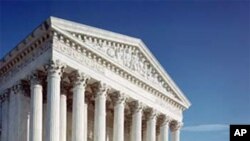Sometime during the next few months, the Supreme Court of the United States will rule on a legal challenge to an anti-terrorism law that critics say limits free speech. The law in question bars material support to terrorist groups. But many U.S. based international aid groups argue that the statute is too broad and should be narrowed.
The case was recently argued before the Supreme Court and stems from a humanitarian law group in California that wanted to support lawful activity by the Kurdistan Workers Party in Turkey and the Sri Lankan group, the Liberation Tigers of Tamil Eelam.
Both groups are among dozens of organizations on the U.S. State Department's list of foreign terrorist organizations, and therefore subject to the material support law that bans aid, training, services and expert advice to those groups.
But critics of the material support statute argue that it amounts to placing limits on free speech by preventing aid groups from advising designated terrorist groups on issues such as peace and conflict resolution.
Georgetown University law professor David Cole presented the oral argument challenging the law before the high court.
"The government cannot, consistent with the Constitution, make it a crime to engage in lawful discussion of peaceable activities," said David Cole.
Cole was part of a panel discussion at Georgetown University Law School and said many aid groups also find the material support law overly broad and confusing.
"So you are permitted to join one of these organizations," he said. "You are permitted, the government says, to go meet and discuss matters with the organization. But if you engage in any coordinated advocacy, you are a criminal and can face 15 years in jail."
U.S. groups committed to peace and conflict resolution say the material support law inhibits their efforts around the globe.
Jeff Seul is with the Peace Appeal Foundation, a peace activist group launched in the late-1990s by several Nobel Peace Prize winners.
"We believe that democracy is about talk, and the idea that talk can work," said Jeff Seul. "We really don't approve of the violence that is used by parties on either side of the conflict. And this case matters to us because we have feared prosecution from our activities."
The Obama administration is urging the Supreme Court to keep the material support law intact.
Solicitor General Elena Kagan told the nine justices on the high court this week that the law remains a vital weapon in the continuing struggle against international terrorism.
The Supreme Court heard oral arguments in the case the same week that Afghan national Najibullah Zazi pleaded guilty to plotting a bomb attack on the New York City subway system.
Attorney General Eric Holder said the Zazi case proves the need for prosecutors to use all of the tools at their disposal.
"We are at war against a very dangerous, intelligent and adaptable enemy and we must use every weapon available to us in order to win that war," said Eric Holder.
Anthony Barkow is a former federal prosecutor who is now with the New York University School of Law.
Barkow told the Georgetown panel that there are enough legal safeguards in place to prevent aid groups from being wrongly prosecuted. He said the material support law should be preserved as an important legal weapon in the war on terror.
"Those cases could be policed through other mechanisms and therefore avoid the court issuing an opinion that could strike down or significantly limit this really essential tool in the arsenal of national security prosecutions," said Anthony Barkow.
During oral arguments, several of the Supreme Court justices aggressively questioned lawyers for both sides in the case. Justice Anthony Kennedy, who often casts the deciding vote on the sharply divided court, said it was a difficult case for him. Kennedy is a frequent defender of the free speech rights guaranteed under the First Amendment of the U.S. Constitution.
The high court is expected to issue a ruling in the case sometime before the end of June.










